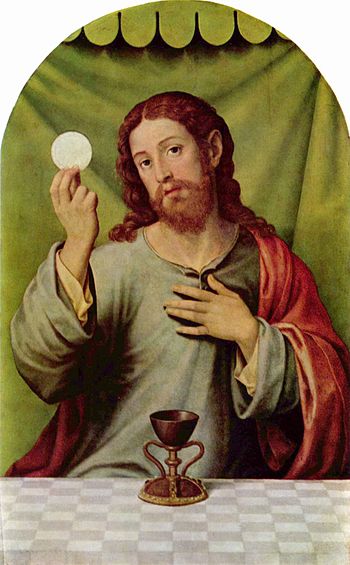In this world we see lots of religious groups and can find lots of people they believe in god/God. But we can wonder in which god or God they believe. The majority seems to believe in an other god than the God of the Bible. That god of the Holy Books is a Singular Spirit Being, though the god of the majority of Christians is for example a three-headed god who at moments does not know everything and can not do everything. The opposite, the God of the Bible is an All-knowing God Who is able to do everything. It is a god Who cannot be seen by man, who also can do nothing to Him. The god of those so called Christians is a god who was seen by many (though they did not fall death) and could be killed by man. This should have many wondering more about that non-eternal god who even did not know when he would be coming back or when the end-times would come. That last bit though being of very importance, because than it would be too late for people to change of idea or to come to God.
Jesus told many parables where he showed how careful we have to be not to miss the boat. He warned with his stories how when not being attentive we can miss his return and even worse miss our chances to enter the small gate of the Kingdom of God. Sharp-eyed we should be looking for the signs of that times to come.
In the capitalist world people come more under pressure and with many modern tools and electronic gadgets lots of people are drawn away from the Eternal Divine Creator God. People have become convinced they themselves can create the world how they want it and can do whatever looks best for them, to make them richer. The majority came to love the world and want to be full part of that world, they think they can manage and control.
In this world not many are willing to confess with their mouth the sent one from God who came to save the world. Not many are willing to believe that man would have been taken out of the dead. they should know we are given a chance to be saved.
Romans 10:9 UKJV That if you shall confess with your mouth the Lord Jesus, and shall believe in yours heart that God has raised him from the dead, you shall be saved.
The majority do not want to see how Jesus is that “sent one from God” by whom we can come closer to God because he is the way to God.
John 14:6-7 UKJV Jesus says unto him, I am the way, the truth, and the life: no man comes unto the Father, but by me. (7) If all of you had known me, all of you should have known my Father also: and from henceforth all of you know him, and have seen him.
God provided the Book of books to guide us and to allow us to grow in knowledge of God and of Christ. But not many people are interested in taking up those books and to read them. They prefer to follow their own traditions and if they want to believe and go to church, they prefer to go to a church where not to much of their free time is taken up and where they do not have to listen to much of those old writings. How more entertainment there is given in their church how more they love it. Readings from Scripture are of no interest to them.

Also concerning doing something for God and Christ not many feel called to take steps to go preaching about bad or good times and about the Kingdom of God. Some who may hear something, do more like Jonah, who instead of going to Nineveh to preach the Word, as God bade him, disliked the work, and went down to Joppa to escape from it. At all times there have been occasions when God’s servants shrank from duty or even went to teach other things than the Scriptural matters, because those things were much more liked and got more attention. That should remind us of Demas who could have been a potential champion in the New Testament. He travelled and ministered with Paul on several missionary campaigns. At the moment he was most needed by Paul, the waffling man bolted and sought pleasure over sacrifice; temporal delight over eternal gain. Had he stayed the course in faithfulness his name would be held in high esteem today, but now we see that he was disgraced.
In this world we can see many people who say they are Christian but have taken an other god than Jesus. For many Jesus is their god and blinded by human doctrines they do not manage to hear the words of Jesus when he tells about what he is doing and by Whose Power he is doing all those incredible things.
Many people also want to reap their own deeds, like Jonah did, being filled with their own ways. Instead of playing the Jonah, man should better listen to the Words of God and to the words of His many messengers and prophets, like Moses, Abraham, Isaiah and Jesus. Unless you wish to have all the waves and the billows rolling over your head.
By listening to those words, notated in the Holy Scriptures we are given the opportunity to learn more about all those who worked for God and can come to see and learn how we too can come closer to God, like they also came very close to God.
It is by our willingness to read those ancient books, and by following those words for what they tell, and not for what human beings like theologians want people to believe there should be written, that we can come to understand how everything fits the Plan of God and how we can find the Only Real God Who is One and not two or three.
From history we should know that it is man’s pride which always has brought his fall down. From looking at man’s evolution we should learn about the rise and fall of historic civilisations and what it tells us about our own growth.
Collapse can be defined as a rapid and enduring loss of population, identity and socio-economic complexity. Public services crumble and disorder ensues as government loses control of its monopoly on violence.
Virtually all past civilisations have faced this fate. Some recovered or transformed, such as the Chinese and Egyptian. Other collapses were permanent, as was the case of Easter Island. Sometimes the cities at the epicentre of collapse are revived, as was the case with Rome. In other cases, such as the Mayan ruins, they are left abandoned as a mausoleum for future tourists. {Are We On The Road To Civilization Collapse?}
Those living in the beginning of the 21st century should come to see that they are the ones living in a time spoken about on several occasions in the Scriptures. The Book of books warns us for these times, and it is up to us to see it or to ignore it.
And while our scale may now be global, collapse appears to happen to both sprawling empires and fledgling kingdoms alike. There is no reason to believe that greater size is armour against societal dissolution. Our tightly-coupled, globalised economic system is, if anything, more likely to make crisis spread. {Are We On The Road To Civilization Collapse?}
Man should come to see that he made a mess of it all. He got the right to handle the creation and to show god that he could manage and govern it rightly. Man had doubted God His position to Master it all. Now it is getting high time we come to agree that God is the Most Righteous to govern the universe.
People became increasingly specialised but also very disconnected from the production of food and basic goods. They thought they could play for God, and many did feel as if they were god. There disrespect for God’s creation made that they even did not come to see how they were destroying their own universe.
Think of civilisation as a poorly-built ladder. As you climb, each step that you used falls away. A fall from a height of just a few rungs is fine. Yet the higher you climb, the larger the fall. Eventually, once you reach a sufficient height, any drop from the ladder is fatal. {Are We On The Road To Civilization Collapse?}
Many passed the Jacob’s ladder and most people got blinded by the many theories from scientists and theologians, instead of listening to the Words written down in the Book of books and showing proper respect for the divine Creator and His creation.
Reflecting about how everything came into being and how so many things went wrong, showing a willingness to listen to what is written in the bible, people can come to know the Only One True God. And that is what we all should do urgently!
It is God’s Will that each individual shows were his or her heart wants to be and if he or she is willing to accept the Eternal Elohim Hashem Jehovah as the Only One true God.
+
Preceding
Tri-union gods and Pagan, Christian, Muslim and Jewish views on the Creator God
A King who wanted to extol a King above all kings
++
Additional reading
- Creator and Blogger God 9 A Blog of a Book 3 Blog about Prophecy
- Science, belief, denial and visibility 1
- Only One God
- God is one
- Is there no ‘proof’ for God? (And why that statement is not as smart as you might think.)
- 3rd question: Does there exist a Divine Creator
- A 1st reply to the 4th Question Who is God 2 A Singular Supreme Spirit Being
- Trinity matter
- Denominationalism exists because?
- Americans their stars, pretension, God, Allah and end of times signs #1 Abrahamic religions
- Americans their stars, pretension, God, Allah and end of times signs #2 War on God’s Plan, Name and title
- Back from gone #2 Aim of godly people
- Back from gone #4 Your inner feelings and actions
- Responsibility bigger than those who talk about worldly matters
- Prophecies over coming days
- Honest-hearted people are losing faith in humanity and humanity losing faith in God
- Decrease in church attendance not only a recent feature #3 The German Scare
- Do you really know what you say you believe in?
- Entrance of a king to question our position #2 Who do we want to see and to be
- Seeing or not seeing and willingness to find God
- People Seeking for God 3 Laws and directions
- People Seeking for God 6 Strategy
- People Seeking for God 7 The Lord and lords
- O God, How Long? ~ Psalm 74
- Responsibility bigger than those who talk about worldly matters















 Of those
Of those 


















































![epic singer [Credit: Courtesy of John Miles Foley]](https://i0.wp.com/media-2.web.britannica.com/eb-media/05/319x450x138805-004-DE97092E.jpg.pagespeed.ic.bPcU3-OVC2.jpg)
















































